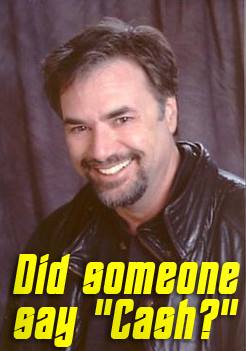I've been doing a little more digging around the subject of
The Tribunes and have found reference to another police-themed project Roddenberry supposedly worked on that was called "Blue Line." It's mentioned in a March 16, 1973 story ("A Future Series?" by Carol Burton for
Newsday, but widely re-published elsewhere):
"There's a police series [The Tribunes] that he and Sam Peebles [sic] will produce for NBC next year...a year from now, "Blue Line," another police story...will be aired."
Some versions of this account refer to it as a movie project, others refer to it as a series. As far as I know, there's nothing about it in any of his biographies. It may have been a vague idea that was never actually written; it doesn't appear in any newspaper database searches after 1973 connected to Roddenberry's name.
Like many utopian visions, it presumes that human nature can be perfected, that people can be educated well enough to be fully responsible and just in their own right, so that they no longer need checks and balances on their excesses. Roddenberry posited an idealized police force that could be trusted to use its power responsibly and compassionately, and thus could be granted more power as a result.
What I was getting at here was a suggestion that Roddenberry's politics regarding the police were more right-wing than is often understood. Here's another article mentioning
The Tribunes—in this account, called
The New Tribunes—from the August 29, 1980 issue of
The Province ("Gene Roddenberry...write or don't eat" by Chuck Davis), which quotes Roddenberry:
I thought: What if we did it right? What if we had a police department where you couldn't get on unless you had a doctorate? Y'know, under certain circumstances a policeman can take a life. A doctor can't. Yet the policeman's education and salary don't reflect that responsibility. If we were a logical society, the policeman would make more than the doctor. I came up with a series based on that concept, The New Tribunes, but the networks want car chases and want their cops to solve crimes with shooting.
Consider the logic regarding police vs. doctor pay Roddenberry is putting forth here. I tend to put more value in the professionals who are tasked with saving lives. But—gathering Roddenberry's many comments about the police has become somewhat of a pet project in light of current events. I'll do something with that eventually.
Lastly—and you may not remember this—
several years ago when describing The Tribunes you said it involved "near-future police officers using advanced technology and methods." That was the same conclusion I drew about the setting when reading the description of the pilot from James Van Hise (which is, for better or worse, the most detailed account of the concept that currently exists). As previously articulated, based on the information we have, I don't buy into your current contention that the series was meant to be set in the present day. But I'm fully prepared to be completely wrong on that front if any story material from the pilot development process ever sees the light of day.







